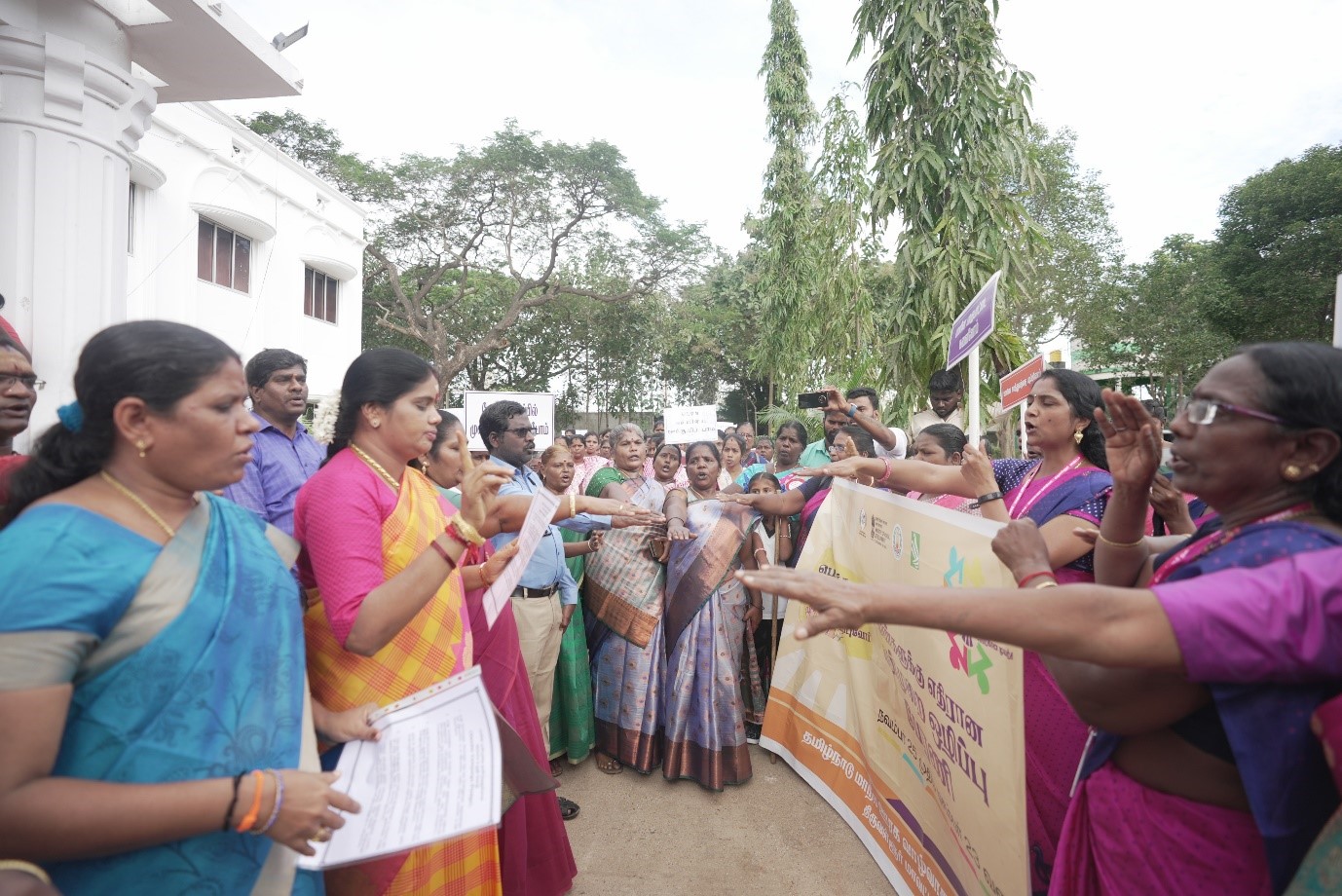Strengthening Capacities of Rural women through DAY-NRLM institutional Framework

Achieving gender equality is paramount for a peaceful, prosperous, and sustainable world. Women and girls represent half of the world’s population and therefore also half of its potential. But gender inequality persists everywhere, stagnating social and economic progress. In the context of India, out of the 135-crore population, 65.13 percent live in rural India and women constitute 48 percent of total rural population. These rural women who are majorly a part of unpaid work have no access to sustainable income or paid economic activities in their lives. This blog looks at some of the initiatives undertaken by the Deendayal Antyodaya Yojana-National Rural Livelihoods Mission (DAY-NRLM) aimed at empowering women.
Launched by the Ministry of Rural Development, Swarna Gramin Swarojgar Yojana (SGSY) was introduced to provide self-employment to the Below Poverty Line (BPL) households through the formation of SHGs (Self Help Groups) to bring them out of poverty during 1999 to 2011. The programme aimed to ensure that at least one woman member from each rural poor household is brought into women SHGs and their federations within a definite time frame. Prof. R. Radhakrishna (2009) Committee reviewed the performance of SGSY and suggested changes in the design from a ‘top-down poverty alleviation’ approach to a ‘community-managed livelihood’ approach. Based on the Committee’s recommendation, SGSY was restructured into Deendayal Antyodaya Yojana-National Rural Livelihood Mission (DAY-NRLM) by the government to provide a sharper and greater focus as well as momentum for poverty elimination. DAY-NRLM was started with the mission “To reduce poverty by enabling the poor households to access gainful self-employment and skilled wage employment opportunities, resulting in appreciable improvement in their livelihoods on a sustainable basis, through building strong grassroots institutions for the poor.”
Rural women face structural barriers in accessing their right to livelihoods, resources, and social protection, which are important factors in attaining empowerment. Realising the need of the hour, in 2016, gender mainstreaming was introduced within the NRLM program, and it was restructured as Deendayal Antyodaya Yojana- National Rural Livelihood Mission (DAY-NRLM). The approach of mainstreaming was to focus on shaping programs and policies in all verticals with a gender lens, for example- financial inclusion of women can lead to promotion of ownership of bank accounts, promotion of kitchen gardens can improve the health status of women and children, and methods for strengthening independent economic identity of women. The program also believes that mainstreaming of gender within its framework and systems is important to achieve sustainable economic, social, and political empowerment. In addition to gender mainstreaming, the focus was also on the inclusion of the most vulnerable communities- devadasis, single/widowed/divorced women, HIV+, transgender persons, elderly women, survivors of violence and trafficking.
For strengthening the approach of gender mainstreaming in all the verticals, DAY-NRLM introduced another important strategy- setting up of institutional mechanisms at different levels. The focus of setting up of these mechanisms was to establish a demand-supply relationship with other public entities like the Gram Panchayat/Village Council (specific to tribal areas), Gram Sabhas, Anganwadi Centres, Public Health Centres, Public Distribution System, banks, schools, etc and convergence with these line departments. To achieve this, a well-planned gender architecture has been placed at the community level like Gender Point Persons (GPPs), Gender Forums and Social Action Committee (SAC) at village level, Cluster Level Federation (CLF), Gender Justice Centre (GJC) and Gender Resource Centre (GRC) at block level. These institutions have been formed so that SHG members can approach them in need. The Gender Forum and the VO-SAC together prepare a Gender Action Plan to resolve critical gender issues in the village. The VO-SACs and Gender Forums also monitor progress on actions and report on them to the Cluster Level Federation (CLF), which aggregates agendas for all Village Organisations (VOs) under them. Through these collective actions, they are playing a pivotal role in uplifting women’s condition and position in society by identifying, acknowledging, and addressing issues of discrimination.
The program has also given a platform for the capacity building for sustainability of these women federations through experienced gender experts called the National Resource Person (NRP). The NRPs train community resource persons (CRPs) at block level and help them to make Gender Operational Strategy based on the issues they are facing in their respective blocks and villages. Further, these CRPs train VOs and GPPs on gender concepts. Since the inception of gender mainstreaming in the program and as a result of these trainings, an improvement in indicators related to women empowerment has been noticed, which includes- sex ratio, participation in household decisions, having an account in the bank, having land in her name alone or jointly etc. In continuation to this, women’s autonomy and participation in grass root governance have also been seen in recent years. They have recognised their participation in Aam Sabha and Gram Sabha as well as in panchayat elections, which have been a huge milestone for this program as not only at socio-economic level, but women are heading towards political empowerment also.
Besides taking up issues related to gender discrimination, the institutional mechanisms of the program have proved its efficacy by addressing social evils. For example, the states of Jharkhand, Kerala, Maharashtra, Odisha, and Andhra Pradesh through the NRETP (National Rural Economic Transformation Project) under DAY-NRLM have successfully taken up the issue of Anti Human Trafficking and worked towards ending it with the help of community institutions. Witch hunting, which is an old social scourge practised mainly in rural India is one of the most challenging issues in states like Jharkhand, Madhya Pradesh, and Rajasthan. To curb this practice, DAY-NRLM and JSLPS (Jharkhand State Livelihood Promotion Society) has introduced Garima Project in 2020 and an institution called Garima Kendra has been established at CLF level, which aims to eradicate this practice. Another important social issue is Gender Based Violence. DAY-NRLM through its programs has been capacitating the women federations on how to deal with GBV cases with sensitivity and approach the concerned line departments for help. For this, a new federation called Gender Resource Centre (GRC) has been formed in 15 states at block and Gram Panchayat levels which would be taking issues mainly on GBV cases. In case of child marriage, DAY-NRLM has been training women federations through NRPs on how to prevent it.
DAY-NRLM is an ongoing program which aims to mobilize poor households and address gender related issues along with State Mission Units (SMUs), women’s institutions, and line ministries. It also believes in engaging men and boys as their involvement is crucial to achieving gender equality. The Mission seeks to reach out to around 10 crore rural poor households in a phased manner by 2023 and impact their livelihoods significantly. There are many stories of hope and resilience, where DAY-NRLM institutions have given voice and support to these rural women empowering them to realize their true potential.
This blog is authored by Mrs. Ankita Sharma, Senior Research Associate at IWWAGE.
- Posted In:
- Latest Blogs

















































Leave a Reply